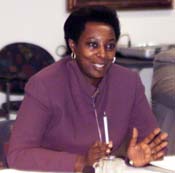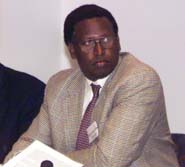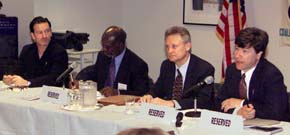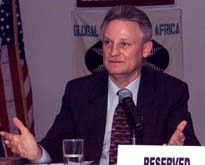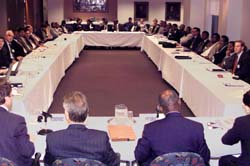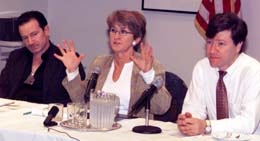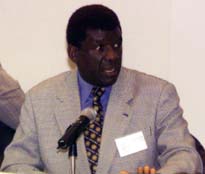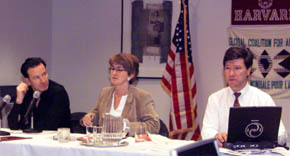|
|
|
The meeting aimed to bring together key stakeholders to promote debt forgiveness and a transparent debt relief programme. Over the course of the two-day meeting, participants considered HIPCs' debt repayment experiences, the recent Cologne Initiative of the Group of Seven countries (G-7), alternative approaches to debt relief and the role of NGOs and HIPCs in achieving debt relief. Participants were also addressed by leading figures from the debt relief movement, including the musician Bono, economist Jeffrey Sachs and US Congressman Spencer Bachus. The meeting's main outcome was agreement on a set of principles on achieving debt cancellation. The principles are intended to generate support for redesigning and strengthening debt relief programmes at the highest levels, particularly among bilateral and multilateral donors.
|
|
|
|
OPENING
PLENARY
|
|
|
Ahmedou Ould-Abdallah,
Executive Secretary of the GCA (seated on the right), welcomed participants
and noted that the meeting was very timely given the G-7's recent
Cologne Initiative and designation of the upcoming World Bank and
IMF joint annual meetings as the venue for developing concrete debt
relief measures. |
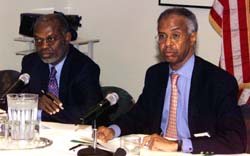 |
| Carole Collins, Jubilee 2000/USA Coordinator, noted that debt relief is an ongoing topic of debate within the US Congress. She said progress on the issue is hindered due to Republican opposition to debt relief and proposals to relieve debt through diversion of development funds. She noted that people in HIPCs often turn to NGOs for assistance when governments fail to meet social needs and underscored that NGOs cannot sustain the burden of providing services governments do not deliver. | |
|
Steve
Radelet, CID, drew attention to an IMF announcement to use gold sales
to finance a portion of debt relief. He said the proposal could signal
that the IMF is serious about debt reduction and catalyze other agencies
to take action. Collins asked why, if such book transactions can "magically"
erase debt, the debt cannot be forgiven without resorting to such
"contortions," and asked what the underlying political reasons for
such a complex procedure might be.
|
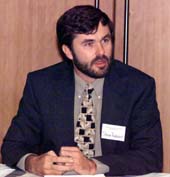 |
| Edith Gasana, Secretary-General of the Ministry of Finance and Economic Planning of Rwanda, underscored the importance of addressing post-conflict needs, such as rebuilding infrastructure and securing drinking water. She emphasized the different circumstances and needs of each country and said HIPCs must have sufficient resource flows to support growth. | |
|
Emmanuel
Anusionwu, Strategic Planning Division, African Development Bank,
highlighted a recent meeting in Paris with donor countries and said
it was evident that donors felt the IMF and World Bank could do more
to fund the Cologne Initiative. He said the ADB's budgetary shortfall
in 1998 would force it to draw on its capital and noted that this
smaller budget would lead to the diversion of resources intended for
development needs to cover countries' debt servicing obligations.
|
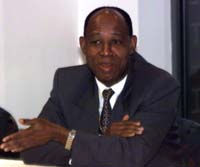 |
|
On the issue
of conditionality, Astere Girukwigomba, Minister of Finance of Burundi,
said conditions should depend on the circumstances of each country
and not be based on prescriptive lists developed by the IMF and World
Bank. He suggested that post-conflict countries in particular require
such a huge investment of resources that their situation should not
be considered in the context of debt relief. |
|
|
Jean
Barut, Senior Economist of the Policy Unit of UNDP Africa, identified
governance and the social sector as areas to consider for conditionality.
Barut said the UN is attempting to coordinate its activities in order
to be more effective and avoid duplication and wastage. He said there
needs to be increased cooperation among UN agencies, the IMF, World
Bank, countries and civil society.
|
 |
|
KEYNOTE
ADDRESSES
|
|
| Kwesi Botchwey (second from the left) opened the afternoon session and introduced Jeffrey Sachs, Director of CID (far right), who welcomed Bono, musician (far left), and US Congressman Spencer Bachus, Republican-Alabama (second from the right). Sachs highlighted Bachus' efforts within the US House of Representatives to approve debt relief and noted Bono's work as an activist in the global movement to address the debt issue through the Jubilee 2000 campaign. | |
|
Sachs
highlighted the history of IMF and World Bank strategies to provide
debt relief and eradicate poverty and described them as being too
little too late. He underscored the need to “call the bluff” of the
proposed Cologne Initiative and called for something substantial and
honest that addresses HIPCs' real needs. He said unwillingness to
forgive debt represented a game between the IMF, World Bank and White
House, motivated by the desire to retain control of HIPCs. He called
on countries to determine how to bring about debt relief.
|
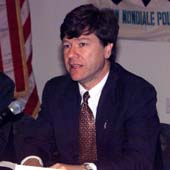 |
| Congressman
Spencer Bachus said greater public awareness of HIPCs' crippling debt
burden and its impact on social spending will provide the catalyst needed
to mobilize the necessary political will. He informed participants that
the focus of US politicians is usually on domestic problems rather than
on the challenges faced in other countries and stated that, although
this not a high-profile issue in the US, he will work for full debt
forgiveness, as it is "morally the right thing to do." |
|
|
Noting all of the fanfare and fireworks planned for the millennium
celebration, Bono said the only idea big enough to fill the shoes
of this date is that of debt relief. Characterizing the argument for
debt relief as economic, moral and spiritual, he noted the widespread
support for the Jubilee 2000 movement, including from people of all
religions, economists and pop stars. He stated his desire to be a
part of restructuring the relationship between the so-called "developing"
and "developed" worlds.
|
 |
|
Picture of the of the meeting room at the Carnegie Endowment for International Peace in Washington, DC. |
|
|
DINNER & LETTER FROM POPE JOHN PAUL II |
|
|
In
a dinner address on Friday evening, 24 September, Jeffrey Sachs read
a letter written by Pope John Paul II the previous day in support
of the Jubilee 2000 debt relief campaign. The Pope wrote that the
need for debt relief is urgent and in many ways a precondition for
the poorest countries to make progress in their fight against poverty,
and appealed to all involved, especially the major industrialized
nations, to "take a decisive step towards definitively resolving the
debt crisis."
|
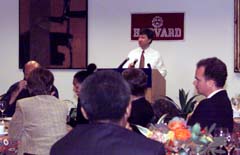 |
|
CONSIDERATION
OF THE ROLE OF NGOS AND HIPC COUNTRIES IN ACHIEVING DEBT RELIEF
|
|
| Ann
Pettifor, Jubilee 2000 Coalition (center), stated that debt relief is
a perfectly comprehensible issue that has been obscured and clouded
by people who want to keep the public uninformed. Pettifor said the
fact that international relations has no equivalent to a domestic bankruptcy
law means debt is not written off and people in HIPCs are being burdened
by debts incurred many years ago under previous government administrations. |
|
|
A
participant from Liberia noted difficulties in transmitting information
on developments in Africa to other parts of the world and emphasized
the need for allies to amplify the voice of Africa. He encouraged
efforts to strengthen civil society and noted that it is weakest in
post-conflict countries. He called for action to focus the world's
attention on the proposed meeting of African countries and the G-7
|
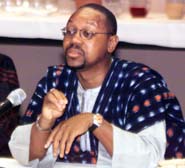
|
|
Another
participant from Tanzania emphasized ownership of the reform process
and country determination of priority areas for public expenditure.
She called upon Jubilee 2000 to assist with the education of civil
society in HIPCs on the magnitude of the debt problem and urged Jubilee
2000 to establish contact with peace activists and women activists
in Africa.
|
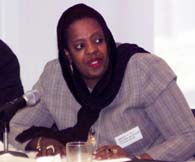 |
|
CONSIDERATION
OF PRINCIPLES ON DEBT CANCELLATION
|
|
|
On Saturday, 25 September, Sachs (on the right) introduced ten basic principles based on the ideas and suggestions discussed at the meeting. He noted that these principles had been kept general to accommodate the diverse ideas expressed and said they should be something both debtors and donors could agree to. These ten basic princinples are outlined at the end of SD's summary of the meeting, available above. The official version will be available from from the Harvard CID web site on HIPCs |
|
|
.
Sachs noted that the complication with ADB debt is that it is money
African countries owe to themselves. In response to a question as
to how repetition of the same situation in 20 years could be avoided,
Bono said the principles being elaborated today would reduce the risks
of such an eventuality. In closing, Bono underscored the need to speak
with a collective, unified and clear voice.
|
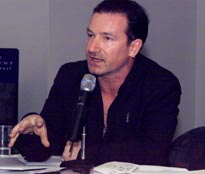 |
|
Related web sites |
©1999, IISD. All rights reserved.


